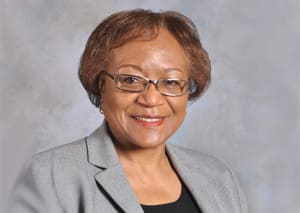Here at Embark, we’re on a mission to improve the life and longevity of all dogs through science and technology. We’re jazzed up to celebrate the unique contributions that have made an impact on veterinary medicine. After all, it‘s in our DNA. So in honor of Black History Month, we’re spotlighting one of the most influential Black legacies in veterinary medicine.
The Tuskegee University College of Veterinary Medicine (TUCVM) formerly the School of Veterinary Medicine was founded by Dr. Frederick Douglass Patterson in 1944. Dr. Patterson was born on October, 01, 1901 in Washington, D.C. and was named after renowned activist Frederick Douglass. By the age of two, both his parents had died from tuberculosis and his sister Bessie became his caregiver. Bessie invested in her brother’s education and by age 31, Frederick Douglass Patterson had achieved a Masters of Science and a doctorate of veterinary medicine from Iowa State University, followed by a doctorate of philosophy from Cornell University.

In 1935, Dr. Patterson became the third president of Tuskegee Institute (now Tuskegee University). He elevated Tuskegee’s work through programs like the commercial aviation program, which developed into a government training site and full air base at Tuskegee. Dr. Patterson’s efforts made way for the trailblazing Tuskegee Airmen of the World War II U.S. Army Corps. During this time, the American Military was racially segregated and the Tuskegee Airmen were the first Black military aviators in the U.S. Armed Forces.
Nearly a decade later in 1944, the United States with allied troops invaded at Normandy, and Paris was liberated from Nazi occupation. The beginning of the end of World War II was unfolding and Franklin D. Roosevelt became the only U.S. president to be elected to a fourth term. That same year, in concert with the School of Veterinary Medicine (now TUCVM), Dr. Patterson founded the United Negro College Fund (UNCF) which today administers 10,000 scholarships every year to 37 history black colleges or universities (HBCUs). Today TUCVM is the only veterinary medical professional program located on the campus of a HBCU and has educated 75 percent of Black veterinarians in America. As the leading diverse school/college of veterinary medicine in the United States, the TUCVM legacy continues to break ceilings. Below are some TUCVM alumni who have made Black Veterinary History:
Dr. Alfreda Johnson Webb who earned her Doctorate of Veterinary Medicine from Tuskegee in 1949, became one of the first Black women in the country to graduate with a veterinary degree.

Dr. Ruby L. Perry graduated from TUCVM in 1977 and is now dean of her alma mater. She is TUCVM’s first female dean and first veterinary alumna to serve as Tuskegee University’s acting president. Along with many contributions to the veterinary community, Dr. Perry is the first Black female, board-certified veterinary radiologist in the American College of Veterinary Radiology (ACVR).

Dr. Erika Gibson graduated from TUCVM in 2001. She began her residency in neurology and neurosurgery at the Matthew J. Ryan Veterinary Hospital of The University of Pennsylvania in 2005. Upon completion in 2008, Dr. Gibson became the first Black board-certified veterinary neurosurgeon in America.

Dr. Diarra Blue, Dr. Aubrey Ross, and Dr. Michael Lavigne, stars of The Vet Life reality TV show, each attended TUCVM, where they earned their Doctor of Veterinary Medicine degrees. The Animal Planet show has had six seasons and is the first-ever TV series to follow three Black veterinarians who own and operate a full-service veterinary hospital and animal shelter in Houston, Texas.


Mo Osinubi Contributor
An animal lover at heart, MO grew up with a Rottweiler puppy named Sheba, who sparked her love for animals. Throughout high school, MO worked as an aquarium guide at the New England Aquarium and dreamed of becoming a marine biologist. However, her passion for writing and media led her to study marketing and communication. At Embark Veterinary, MO is a Senior Growth Marketing Manager and is delighted to bridge her love for animals with her career.
Read more about Mo Osinubi












